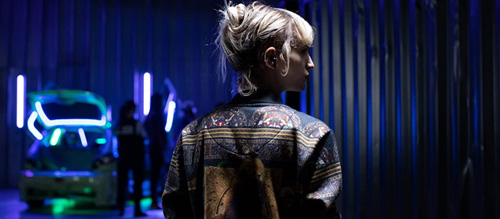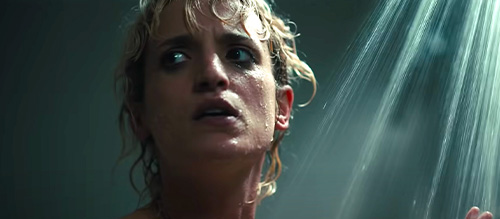Titane (2021) Review

Titane (2021)
Director: Julia Ducournau
Screenwriter: Julia Ducournau
Starring: Agathe Rousselle, Vincent Lindon, Garance Marillier, Myriem Akheddiou, Bertrand Bonello
In the leadup to its debut and eventual Palme d’Or triumph at the 2021 Cannes Film Festival, Julia Ducournau’s second feature Titane was shrouded in mystery, the first synopsis released to the press simply being the definition of titanium, the English translation of original French title (“A metal highly resistant to heat and corrosion, with high tensile strength alloys”). If this, by some twisted miracle, somehow takes off in mainstream culture, Titane will likely become known to the average moviegoer as “the car-f***ing movie” just as The Shape of Water was “the fish-f***ing movie” and Call Me By Your Name was “the peach f***ing movie”, but it offers so much more than meets the eye.
To give a very general plot synopsis to avoid the massive surprises in store, Titane follows Alexia (a mesmerising debut from Agathe Rousselle), an objectophiliac exotic dancer who has a titanium plate in her skull from a childhood car accident. Following a chain of violent events, Alexia finds herself a fugitive on the run before forming a strange and unlikely connection with grieving middle-aged firefighter Vincent (Vincent Lindon). That’s about all that is safe to divulge – we wouldn’t want to ruin the surprises, and there are many.
Five years ago, Julia Ducournau released into the world her feature debut Raw starring Garance Marillier, who crops up in a supporting role in Titane. It was the sweetest, strangest cannibal coming-of-age film anyone is likely to see in their lifetime, with the power to make you laugh, make you cry, make you utter strange and involuntary noises, and peek out between your fingers at some of the things Ducournau is choosing to show you. Titane is this, but turbo-charged (car pun definitely intended).
Ducournau has frequently professed a love of David Cronenberg in interviews, and his influence is certainly in evidence here. Crash and Videodrome are probably the most obvious and directly referenced touchstones on Titane for the car fetish and technological invasion plot elements, but you can also see shades of tech/body-horrors from other filmmakers like Shinya Tsukamoto’s Tetsuo. Anyone who has rigid ideas regarding gender norms or conforming to your assigned physical shell from birth will likely not get on with Titane, and be warned that you will see human bodies being broken down and forcefully reformed in a variety of unpleasant ways.
The director has also spoken about a vivid recurring nightmare of hers involving cars that inspired several of the central elements of her film’s story, particularly the I-can’t-believe-I’m-actually-seeing-this finale (which we will not spoil here). The startling imagery on show throughout the film includes, but is not limited to, some nasty business involving chopstick hairpins and nipple piercings getting caught in things, self-imposed and otherwise bodily transformation, and deeply uncomfortable – sometimes figurative, sometimes not – melding of technology and biology.
Genre-wise you might describe this as a horror-thriller or a really, really dark comedy, or the most twisted of dysfunctional family dramas out there to the extent that it makes Bong Joon-ho’s Parasite look like a mainstream sitcom in comparison. Alexia is not remotely understood by her distant father (Bertrand Bonello) to put it mildly, their relationship going downhill from a car crash, and most of the friendships she forms are short-lived and deeply unhealthy affairs. Early in the film you also get a sudden and brutal long-take action scene, which despite not racking up the same kind of body count is probably the only sequence this year that even comes close to matching the deranged Gabriel police station fight in James Wan’s Malignant.
At times you’re in danger of being overwhelmed by the sheer number of complex and densely packed underlying themes on show, all intertwining and vying for attention. Is this about contemporary society’s over-reliance on technology, our obsession with youth and vitality, insurmountable generation gaps, the strange ways we process grief and trauma, or all of the above? This is only skimming surface level metaphors, only the tip of this iceberg of ideas.

Agathe Rousselle is a complete revelation in the lead role, throwing herself completely into everything asked of her and quickly mastering an intense stare that is about the only thing in her character that stays the same throughout the film as the rest of her being undergoes various transformations out of necessity. She shares the majority of the screen time with Vincent Lindon, a fascinating and contradictory puzzle box of a character filled with pain and anguish but with so much love to give.
There’s a quote that stays with you long after the credits roll, words that won’t make a lick of sense without the relevant context of the scene and story that precedes it but will benefit from experiencing for the first time cold: “You’re my son, you’ll always be my son, whoever you are”. This is typical Ducournau emotion: earnest, unconditional and yes, strange, love.
With two films, Julia Ducournau has proven herself a standout auteur with imagination and a wicked sense of humour. Her stories and her imagery provoke a primal, visceral reaction from the viewer, who may find themselves reeling from nausea one moment only to have to hold back tears or cathartic laughter the next. We’re a weird species, humanity; prone to bad life choices, impulses and every fetish imaginable; Ducournau knows this and is driven to make cinema that truly reflects it. See Titane on the big screen as soon as you are able; you won’t walk out of there quite the same person but you will have had an experience.
23/24

